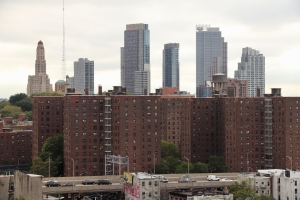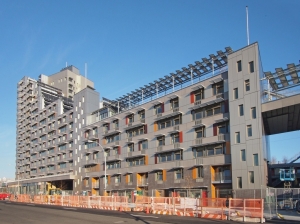
You may have paid little attention to the tax plan rushing headlong through Congress. It has been advertised as a middle-class tax break and an inducement to business to create jobs through a dramatically lowered corporate tax rate. Pay attention, especially if you live in a city or suburb, as most of us do.
Media and opponents of the plan have focused on the elimination or possible reduction in the deduction for state and local taxes and a possible $500,000 cap on deduction of home mortgage interest. I’ll get to these. Much worse could be in store.
Enormous Gifts to Real Estate—and Trump
Tax reform was in part inspired by the sensible idea that egregiously abused tax-avoidance loopholes that don’t help the economy should be closed. Instead, they live on and have even been sweetened. If, like me, talk of carried interest and like-kind exchanges sets your head spinning, James B. Stewart, the New York Times “Common Sense” columnist, explains it all for you here.
You’ve no doubt heard that the plan significantly enriches wealthy individuals not just companies. It confers enormous tax advantages on investors, penalizing even highly salaried wage earners. But the people who reap the biggest gains are . . . surprise! . . . real-estate developers and investors. Even the Alternative Minimum Tax, which is supposed to make high earners with lots of deductions pay at least some tax, may not survive the secret negotiations.
What does this matter to cities? The plan appears to increase the concentration of wealth in fewer hands, and those people are likely to put those gains into real estate, because it is so heavily favored. As Stewart writes, “The proposals seem almost tailor-made to enrich the president and people like him.”
We’ve seen this movie before.
How About a Bubble?
President Ronald Reagan signed tax cuts in 1981 that—in contrast to the current program—dramatically reduced personal income tax rates. What echoes through the years was how generous they were to real-estate development. With abundant tax shelters, lax regulation, and interest rates rapidly cut from historic highs (my 1985 starter-house mortgage was 13%!) developers threw up shopping centers, luxury hotels, strip malls, and subdivisions with abandon. They still shape the skylines we see today in Atlanta and Dallas, among others.

The tax advantages were so extraordinary that lining up tenants before breaking ground seemed a bothersome legacy of some other, duller era. Everyone wanted into the too-good-to-be-true boom, including Savings & Loans, historically conservative lenders to middle-class homeowners.
It all went south in the late 1980s, exposing vast fraud among the S&Ls (killing the industry), almost sending Sen. John McCain to jail, and leaving hundreds of thousands of foreclosed homes, empty hotels, and see-through office-buildings. Bailing out the industry cost the taxpayers some $160 billion. Commercial construction did not recover until the mid 1990s.
Can it happen again? Of course not; we know better.
That’s what they said before the Great Recession.
Pricier Cities
With global wealth rapidly growing and concentrating in fewer hands, cities with lots of amenities have already been drawing people with means to live in them or at least buy their rapidly appreciating real estate. Such cities are already extremely expensive and this plan is likely to put more pressure on prices. Parking money in condos is already a major industry in New York, Los Angeles, San Francisco, Portland and Vancouver.
Under the tax plan, chances are more money will pour in, driving even more people of lesser means out. Displacement in the wealth-magnet cities that have hot markets is already driving away desirable talent. People who fight fires, teach children, work in retail, warehouses, and factories or have low-end or entry-level office jobs are leaving, too—if they can. At the low end, thousands are being driven onto the streets: Two thirds of New York City’s record number of homeless are families! Brightly colored tents of homeless encampments seem to dot every Seattle freeway intersection. Los Angeles’ Skid Row feels like a third-world slum.
When Michael Bloomberg was New York’s mayor, he thought making the city attractive to the well-off was a good way to boost tax revenues that he could spread around the city. Neither he nor anyone else guessed how many of the world’s wealthy would pour into the city and the degree to which that gushing cash would destroy the housing economy for wage earners. Tax revenue are up, to be sure, but the rise is meaningless in terms of what it would take to subsidize or build housing for those earning less than the market today serves. Housing costs are so outrageous in New York already that a family of four with a $160,000 annual income can qualify for a subsidized unit. (Just try and get one, though…)
Bad to Be Rich
I am aware of no time that it has been a problem for cities to be wealthy. It’s now so bad in New York that the poorest communities reject libraries, parks, cultural institutions, and transit improvements, fearing they will developers, resulting in displacement.
Even cities that aren’t thick with trust-fund kids and hedge fund kingpins are feeling the heat of higher house prices now that the economy has begun to pick up across the country. Affluent people are pushing up the high end, but prices are rising across the board because stagnant wages and high levels of personal debt have kept the supply of homes to buy tight. The national homeownership rate continues to drift downward. Rents are also high thanks to millions of households thrown out of ownership by the foreclosure tragedy. As America becomes a nation of renters, fewer households get any help with the cost of shelter. Renters get no subsidy at all unless they are among the fraction of low earners who manage to get subsidized housing. (Only about one in four of those who qualify for rental subsidies get them.) The nation’s housing mess is a key reason working people feel the system is rigged.
It will get worse under this tax “reform”: The job of average wage earners would be to pay the taxes the rich are avoiding.
Hitting the most vulnerable
To add insult to injury, tax credits that help cities thrive and help people afford to live in them, are on the chopping block.
Say goodbye to a leg of the wobbling subsidized-housing stool, the Low-Income Housing Tax Credit. Trips off the tongue, doesn’t it? It is little heralded but has become an essential tool in financing affordable housing across the country in the absence of any more rational or substantial commitment by the federal government to aid below-market housing. The credit essentially bribes companies and affluent people to make affordable-housing investments. If it is not killed outright, the credit will likely lose all its value because those who would use the tax shelters will no longer need them. (The subsidized housing stock is already declining since landlords in many cities don’t need low-income tenants bearing Section 8 vouchers—the most important low-income subsidy.) Look for even greater homelessness soon.

Preying on the old
The tax bill also cuts tax incentives for restoring historic buildings. This gets no attention, but if you look back to when cities were uniformly written off for dead (the 1980s to well into the 1990s), the tax credit helped make catalytic projects possible, helping organizations fix buildings whose beauty helped to inspire neighborhood revival and economic revitalization as people sought places that were urban and unique. Leveraging $132 billion in private investment, no government program nor business incentives have been remotely as successful at reviving places conventional investors and lenders have shunned. The tax credit costs the treasury almost nothing but the multiplier effect has been extraordinary. The credit remains essential for the revitalization of cities that still struggle, from Buffalo to Birmingham, San Antonio to Duluth.

Don’t Succumb to Property Tax Panic
About the property-tax deduction and the mortgage-interest deduction, which are the only aspects of this plan that are getting any real pushback. Thank the massive lobbying and campaign-contributing real-estate industry. A national strategy to make housing more affordable would include the kind of cap on interest deduction now proposed. It’s a deduction that mainly goes to people who don’t need it, and helps to push prices up. Likewise, affluent families get the greatest benefit from the deductibility of high property taxes. Such taxes are too often used by small municipalities (especially in New Jersey, New York, and Connecticut) to keep lower income people out, and so a deduction cap or outright elimination is well worth discussing.
Equity, of course, is not what this basket of tax deplorable is about. Never has a tax plan been rushed through so quickly and with so little honest debate. Here I pointed out what will likely be seen as unexpected consequences, ones that a more deliberative process would have uncovered. Of course, many of the intended consequences are poisonous enough. Grab your wallet and fasten your seat belts. It’s going to be a bumpy ride. I have not touched on the many poisonous elements that others are much more qualified to assess. Suffice it so say, passiveness in the face of such a despicable scheme is extraordinarily dangerous.
Leave a comment